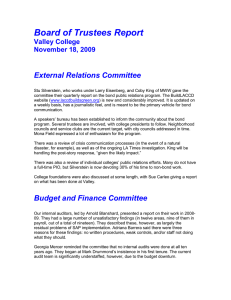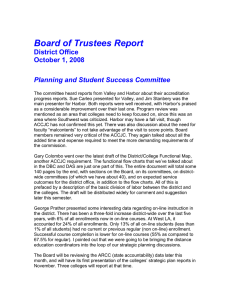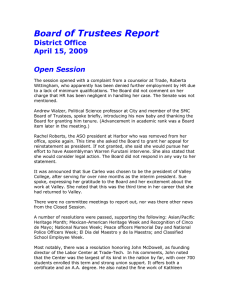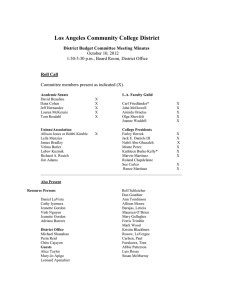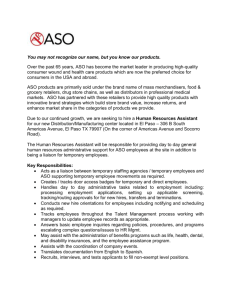of Trustees Report Board Trade Tech College February 25, 2009
advertisement
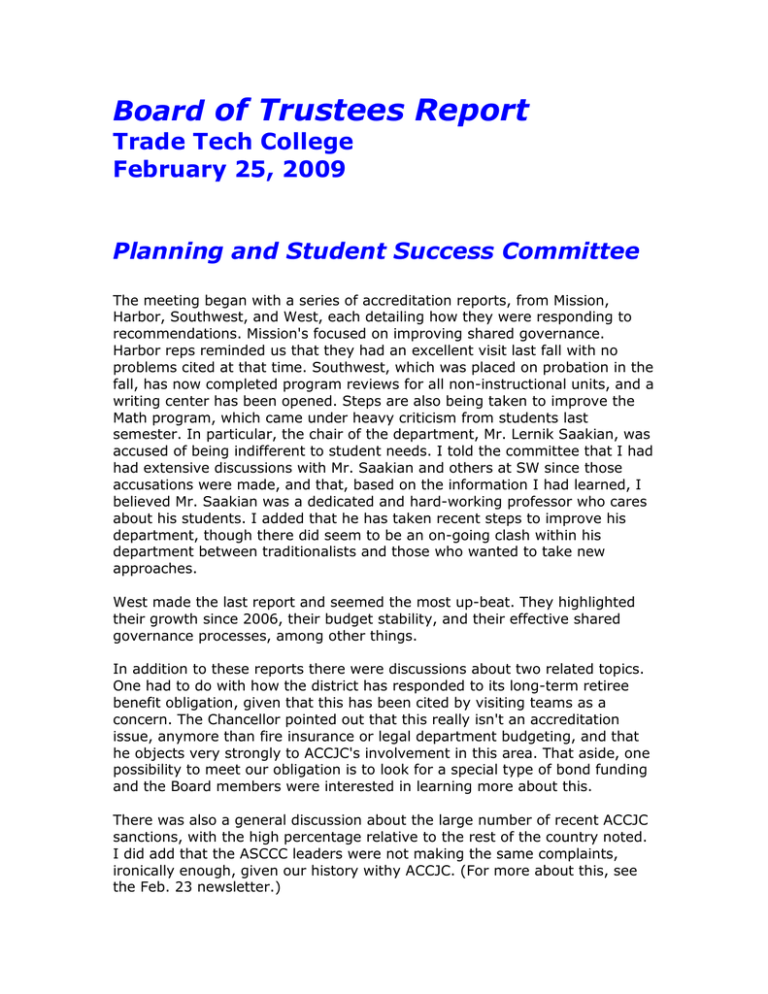
Board of Trustees Report Trade Tech College February 25, 2009 Planning and Student Success Committee The meeting began with a series of accreditation reports, from Mission, Harbor, Southwest, and West, each detailing how they were responding to recommendations. Mission's focused on improving shared governance. Harbor reps reminded us that they had an excellent visit last fall with no problems cited at that time. Southwest, which was placed on probation in the fall, has now completed program reviews for all non-instructional units, and a writing center has been opened. Steps are also being taken to improve the Math program, which came under heavy criticism from students last semester. In particular, the chair of the department, Mr. Lernik Saakian, was accused of being indifferent to student needs. I told the committee that I had had extensive discussions with Mr. Saakian and others at SW since those accusations were made, and that, based on the information I had learned, I believed Mr. Saakian was a dedicated and hard-working professor who cares about his students. I added that he has taken recent steps to improve his department, though there did seem to be an on-going clash within his department between traditionalists and those who wanted to take new approaches. West made the last report and seemed the most up-beat. They highlighted their growth since 2006, their budget stability, and their effective shared governance processes, among other things. In addition to these reports there were discussions about two related topics. One had to do with how the district has responded to its long-term retiree benefit obligation, given that this has been cited by visiting teams as a concern. The Chancellor pointed out that this really isn't an accreditation issue, anymore than fire insurance or legal department budgeting, and that he objects very strongly to ACCJC's involvement in this area. That aside, one possibility to meet our obligation is to look for a special type of bond funding and the Board members were interested in learning more about this. There was also a general discussion about the large number of recent ACCJC sanctions, with the high percentage relative to the rest of the country noted. I did add that the ASCCC leaders were not making the same complaints, ironically enough, given our history withy ACCJC. (For more about this, see the Feb. 23 newsletter.) Finally, Trade Tech made an Institutional Effectiveness report. This was the first to be done in the district, but all colleges will be required to do these now every two or three years. City and East will report on April 29, and the other six colleges will be up next year. The purpose is to have a candid discussion with the committee as to where the college is at in terms of meeting its strategic and educational goals, and whether they are moving in sync with the district strategic plan. In DPC, we have been planning how to do this ever since the district plan was adopted two years ago. A summary data sheet was provided, and then Brad Vaden and Marcy Drummond presented a PPP on Trade's progress. It was a very impressive presentation in many respects, but I did challenge them on two points as it seemed to me overly positive. Shared governance, for example, has flared up again as a problem at Trade. Open Session Chip Chapdelaine, President of Trade Tech, welcomed the Board. He thanked all involved in hosting, especially the Culinary Department. Both Kindra Kinyon and Carole Anderson, Senate and AFT presidents, welcomed the Board, as did Alison Reid, the ASO president. The ASO also presented the Board with some Trade "swag," which was very well received. Rachel Roberts from Harbor protested her recent suspension as ASO president, and alleged that ASO officers are forced to take a political science class as a condition of office. She was supported by Nehasi Lee, a student activist from another campus, but two Harbor students spoke in opposition to her position, as did Linda Spink and Abbie Patterson. Patterson said Harbor had been commended in their last accreditation for having a strong ASO program. The Board, apparently convinced that the suspension was permitted under established administrative regulations and that the class was voluntary, did not offer Roberts a response. Ethan Burrall, a student at Valley, made a highly articulate statement, objecting to filming at Valley when it disrupts student parking. He cited the lack of advance notification. Sue Carleo said they were in communication and that steps would be taken to see that this did not happen again. The Chancellor added that we need to look at district procedures for filming on campuses. No items were reported out of Closed Session. A report was given on the Planning and Student Success Committee meeting in the morning (see above). Trustees Field and Mercer said they were pleased with the progress they heard documented. Board goals for the year were adopted, and Mercer asked that there be periodic reports made on their attainment. It was also suggested that the goals be sent to all faculty in an e-mail blast. The accreditation follow-up and mid-term reports discussed in the morning were also approved. Chancellor Drummond summarized the possibilities of budget trouble ahead, in spite of the recently signed agreement in Sacramento. Property tax revenue could show a further decline in April, the May Revise could hit the CCC's especially hard (given that we’ve gotten off relatively lightly so far), and the voters could reject any of the five ballot measures needed to complete the budget deal. The Consent Calendar was passed unanimously. There were questions about the new Basic Skills Initiative grant, with Mona Field wondering if it was going to pull our staff away from focusing on district problems. Gary Colombo's response was that it was an opportunity for us to enhance funding. I added that, while aware of the danger, it seemed to offer more plusses than minuses. The public/private venture at West was praised by Mark Rocha, in response to another question from Field. He also described a new private bus line service at West. It's now serving 1,000 students, as compared to around 200 with their former shuttle line. The resolution authorizing the issuance of General Obligation bonds was passed (as discussed at the last meeting). It was announced that some Board members visited a LEEDS Platinum facility in Chino on Tuesday, in order to assess its advantages. Also, West was praised for its program working with MEND, a non- profit in the northeast valley, to provide low cost dental care. Comment I was glad to make that statement about Math at Southwest, as I really hate to see someone’s integrity attacked, especially in public (and at length), without some answer being given. Presidents get slammed often enough at Board meetings, but they’re right there and can defend themselves. They also have regular access to the Chancellor and Board members. When faculty are attacked, it can go unanswered unless the Senate and/or Guild leaders speak up. There is a palpable sense of frustration at every college over the high math failure rate. I’ve been working lately with the Math Discipline Council and Deborah Harrington to see what we might do as a district to improve things. More about this at our March 12 meeting at Valley.
